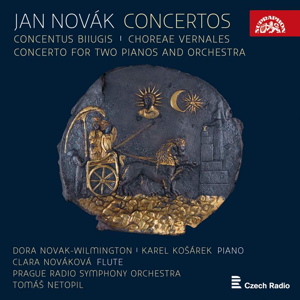
Jan Novák (1921-1984)
Concentus biiugis, for piano four-hands and string orchestra (1977)
Choreae vernales, for flute, string orchestra, harp and celesta (1980)
Concerto for two pianos and orchestra (1955)
Dora Novak-Wilmington (piano), Karel Košárek (piano), Clara Nováková (flute)
Prague Radio Symphony Orchestra/Tomáš Netopil
rec. 2022, Studio 1, Czech Radio, Prague, Czechia
Supraphon SU4331-2 [71]
You wait years for a recording of Jan Novák’s Concentus biiugis and then two turn up almost at once. Last year Toccata released its first volume of Novák’s orchestral music (review) and here’s Supraphon’s own recording, heard in the concerto’s revised version but unless I have missed the detail in the booklet I don’t know who carried it out or why it was necessary.
I’m going to reprise here much of what I wrote about the work and add some final words about the two performances. “The oddly-titled Concentus biiugis (the title is derived from Virgil) for piano four-hands and string orchestra dates from 1977 and its title approximates to ‘a concert of two yoked together’. Its Martinů-derived syncopation is vividly realised and the outer movements are rightly propulsive but the core lies in the central movement. This opens diaphanously, the piano over walking bass before generating greater athleticism. The finale sees another major influence at work: Stravinsky’s The Rite of Spring rhythms encourage glistening and glittering piano writing folklorically angular and a notably successful example of the piano four-hands genre.’
Good as the Toccata release was, this Supraphon is strongly preferable. Each movement is faster, the orchestra is bigger, more present in the sound mix and its accents are more trenchant and rhythmically secure. In the crucial central Lento the faster speed binds the faster and slower sections together more convincingly and though their tempi in the finale are very similar, the Prague Radio Symphony under Tomáš Netopil offer an altogether superior accompaniment with spatial separation of the two players audible. It is of some significance, therefore, that the composer’s daughter, Dora Novak-Wilmington, plays alongside Karel Košárek.
They both perform the Concerto for two pianos and orchestra which, though premiered by Brno forces – Novák was Moravian – had been recorded in 1957 by the composer and his wife, Eliška, with the Czech Philharmonic conducted by Karel Ančerl. The debt to Martinů is audible throughout – it was a debt Novák never forgot and never ceased honouring – but the sonorities are youthful and fascinating, even when antique-sounding elements are introduced. The luscious string writing in the central movement moves into a slow nostalgic waltz, peaks in the central section and relaxes back into the opening mood. The bustling finale seems to owe something to contemporary American models in a few places – Copland, perhaps – and there’s a good-natured communicative cosmopolitan element to the writing, as well as much that is tart and dramatic. It’s a perfect vehicle for the composer and his wife and it proves equally so for his daughter and Košárek.
His other daughter, flautist Clara Nováková, appears in Choreae vernales, a concerto for flute, string orchestra, harp and celesta written in 1980. These Choral Dances were originally written for flute and guitar, then flute and piano and finally in the form presented in this recording. The writing has the sinuous beauty of an Attic vase but one that has come to life, its elysian commentaries lightly burnished by apt orchestration. The charm and elegance of the writing is perfectly calibrated for Clare, for whom it was written, though moments of Bacchic vehemence allow her more athletic opportunities. The finale’s rather classical slow introduction soon gives way to terpsichorean vitality the flute proving an elusive satyr as she leads the dance to a satisfying close.
This is a more-than-satisfactory release, finely recorded – well-balanced too – and annotated. Toccata’s release was the first volume in a sequence of the orchestral music and I don’t know if Supraphon will be as generous but 2024 will be the 40th anniversary of Novák’s death, so here’s hoping.
Jonathan Woolf
Help us financially by purchasing from




















